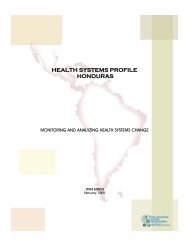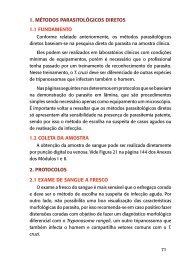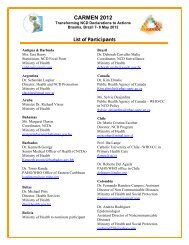EVIDENCE BASED CHRONIC ILLNESS CARE - PAHO/WHO
EVIDENCE BASED CHRONIC ILLNESS CARE - PAHO/WHO
EVIDENCE BASED CHRONIC ILLNESS CARE - PAHO/WHO
Create successful ePaper yourself
Turn your PDF publications into a flip-book with our unique Google optimized e-Paper software.
MAKING HEALTH SYSTEMS MORE EFFICIENT<br />
SUMMER COURSE: <strong>EVIDENCE</strong> <strong>BASED</strong> <strong>CHRONIC</strong> <strong>ILLNESS</strong> <strong>CARE</strong><br />
3a. Self-Management Support<br />
Effective self-management support helps patients and families cope with the challenges of living<br />
with and caring for chronic conditions in ways that minimize complications, symptoms and disability.<br />
Successful self-management programs rely on a collaborative process between patients<br />
and providers to define problems, set priorities, establish goals, create treatment plans and<br />
solve problems along the way. The availability of evidence-based educational skills training and<br />
psychosocial support interventions are key components of a delivery systems self-management<br />
support structure.<br />
3b. Decision Support<br />
Effective chronic illness care programs operate in accord with explicit guidelines or protocols,<br />
preferably evidence-based guidelines, whose implementation is embedded in routine practice<br />
supported by reminders, effective provider education, and appropriate input and collaborative<br />
support from relevant medical specialties.<br />
3c. Delivery System Design<br />
Effective chronic illness care requires more than simply adding additional interventions to an<br />
existing system focused on acute care. Rather, it necessitates basic changes in delivery system<br />
design. Effective chronic care often requires clear delegation of roles and responsibilities from<br />
the physician to other professionals who are full part of the caring team (e.g. nurses, health educators)<br />
and who have the knowledge and time to carry out the range of tasks required to manage<br />
complex chronic conditions. Effective chronic care also implies the use of planned visits, continuity<br />
of care and regular follow-up.<br />
3d. Clinical Information Systems<br />
Timely information about individual patients, and populations of patients, with chronic diseases<br />
is a critical feature of effective programs, especially those that employ population-based approaches.<br />
The first step is to establish a disease registry for individual practices, which includes<br />
information about the performance of important elements of care. Health care teams that have<br />
access to a registry can call in patients with specific needs and deliver planned care, can receive<br />
feedback on their performance, and can implement reminder systems. The model has been successfully<br />
used to improve care of chronic conditions such as diabetes, asthma, congestive heart<br />
failure, depression and geriatrics in more than 300 health care organizations in USA.
















